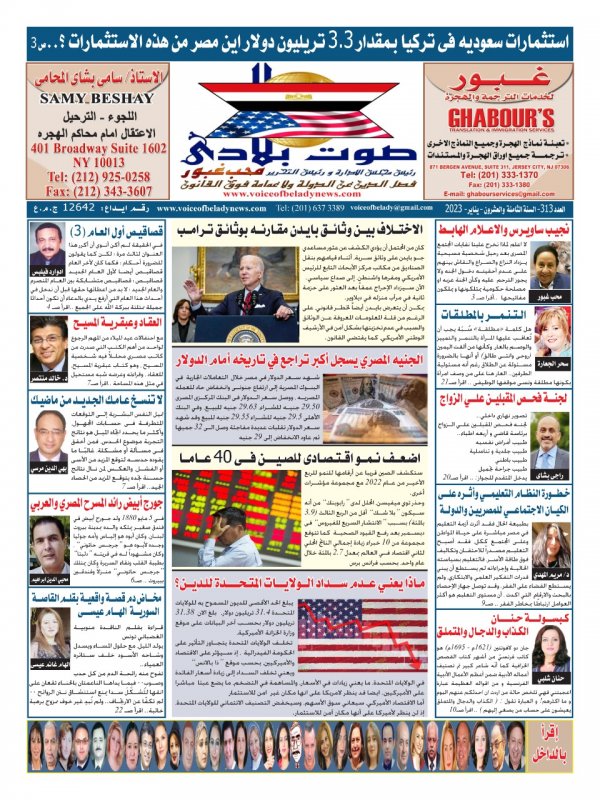How refreshing. Part of the mobocracy in the Arab world is to judge leaders by hearsay, not by performance. There is a weakened sense of nationalism in a 400 million population of whom 40% are illiterate. A combination which makes the rumor and personal interest the parameters for judging leadership performance. Yet, I was lucky enough to look up the sky when a shooting star was streaking across that darkness.
That was an article in the e-journal of Al-Qabas of Kuwait by a leader whom I have known for years to enjoy the gift of critical thinking. It is Ambassador Abdullah Bishara, former Kuwait representative to the UN, and later, the first Secretary-General of the Gulf Cooperation Council (6 Gulf States). I always read his stuff and learn from it: the graceful Arabic rendering; the political analytical approach; the absence of pandering to leadership
Bishara, as the founder and president of the Kuwaiti think tank of diplomatic and strategic studies, has been, and rightly so, critical of Egypt under Nasser (1950-1970), and aficionado of the democracy of Egypt before the Nasser Coup. On that plane, he and I, friends since 1968 (50 years ago) are on the same page. The ideological and contentious trajectory of Nasser's Egypt, and the lack of attention to the sovereignties of other Arab States caused the Egyptian public plenty of headaches.
nder Nasser, the great educational edifice crumbled. It was replaced by the rantings of hucksters, such as MohamadHassanainHeykal of Al-Ahram newspaper who sermonized that Arab leaders who did not accept Nasser's approach to Arab events were "traitors." I had once confronted Heykal at a dinner in Cairo in 1969 about the destructive hegemonic of attributing "treason" to othersز
There has never been a consensual definition of "treason" which the Arab community of nations has reached. Nor can that be reached as each of these countries values its independence as an insulator from outside intervention under the guise of the controversial term "pan-Arabism."
Under Nasser, Egypt became saddled with the inordinate price of his seeking to be a pan-Arab leader. The results were a series of catastrophes: The Sudan split from Egypt; Yemen descended into its first civil war (1962); Israel quadrupled its size following the 1967 war (the Six-Day War). The Arab leaders in Khartoum in 1967 declared: No negotiation, no recognition, no peace. That was at a time when Israel was ready to deal; but Nasser, and behind him, a corrupt Palestinian leadership, were after their image, not after an honorable accommodation.
Three years later, Arafat tried but failed to take over Jordan; the PLO immigrated to Lebanon; and Sharon of Israel, though through genocide at Palestinian refugee camps in Lebanon, forced Arafat and his corrupt coterie to flee to Tunisia. At every step, that failed Arab leadership assigned the word "victory" to every defeat. Even the massive defeat of 1967 was called "the setback" (Al-Naksah). The Nasser scene was one of phony image, but no substance. "The voice of the Arabs" was nothing as radio broadcasts more than unworthy propaganda in the service of Nasser.
Then in 1970, an Egyptian regeneration occurred with Vice President Sadat succeeding Nasser who passed away that year. An under-valued leader, the son of a Sudanese mother, whom the Nasser goons had disparaged and defamed as unfit to fill the shoes of his towering predecessor.
Being the heirs to the legacy of bombast, they were proven wrong. There was talk of attempted coup with AlySabri ready to assume the helm. Sadat, unexpectedly struck back; the armed forces stood solidly behind the legality of succession; and the suspected perpetrators ended up in jail, including the real author of "The Philosophy of the Revolution," Heykal.
With the era of pretended leadership of the fractious Arab world gone, Sadat, a true Egyptian patriot, saw in his presidency two vital goals: Regain Sinai from Israeli occupation, and rebuilding his country through economic and financial opening. As to the Arab world, Sadat ended any form of intervention, whether by the military, by the intelligence services, or by pretentious inflated propaganda.
Egypt, under Sadat, was not above other Arab countries; it acted as an example of a sovereignty which respected the sovereignties of its Arab sister States. Soon the era of good feelings generated by the Sadat regime (1970-1981) paid its national dividends, especially through Saudi Arabia under the enlightened leadership of King FarsalIbn Abdel Aziz. His generosity was crucial to rebuilding, not only Egypt's economy, but also its demoralized huge armed forces.
With the Soviets dismissed by Sadat in 1972, the Supreme Armed Forces Command planned and successfully executed the crossing of the Suez Canal on October 6, 1973; destroyed the Israeli Bar Lev lines and partially penetrated Sinai. Egyptian honor was restored because that was not a fight, a la Nasser in Syria or Yemen. It was a fight by Egyptians, assisted by other Arab countries, for Egyptian liberation. The final outcome was peace with honor in the form of the Egypt-Israel Peace Treaty of 1979 which is still standing.
From Sadat, to Mubarak (1981-2011), to the Supreme Council of Armed Forces (2011-2013), to the transitional government of CounsellorAdly Mansour (2013-2014), to El-Sisi (2014 to the present). The Sadat approach to Egyptian leadership held.
This brings me to the thoughtful assessment by Ambassador Abdullah Bishara of Kuwait in Al-Qabas newspaper in December 2017. Entitled (in Arabic) as "El-Sisi's leadership and Reforming Egypt," the author, eloquently, hit all the right keys. Bishara states that
- Modern Egyptian history records the names of two leaders who relieved Egypt from unprecedented burdens: Sadat, the liberator of Sinai; El-Sisi as Egypt's reformer;
- As the preparations for Sinai liberation distanced Sadat from the woes of its declining economy, El-Sisi came to give that economy his full attention;
- In the process, El-Sisi boldly relieved Egypt's economy from public subsidies for food stuffs, gas, electricity and water;
- Simultaneously, El-Sisi relentlessly pursued all those corrupt officials who have tarnished the dignity of Egypt and its public. There was no truce with those suspected of corruption whhom he exposed to public view;
- Referring to the other national preoccupation of El-Sisi, namely combatting terrorism, Bishara rightly points to El-Sisi perspective on terrorism as a retardant of Egypt's development.
Bishara's conclusion, which happily conforms to the reality of President El-Sisi, is that he is a true Egyptian leader, deeply immersed in his country's economic and social progress. Within that frame of mind, El-Sisi has patterned his diplomatic road map to align it with the improvement of the lot of his people.
Thus, Bishara, finds in El-Sisi approach a negation of the adventurism which characterized earlier regimes. The author sees in that sane and pragmatic approach the best way to stretching the hands of friendship and cooperation to all capitals. The goal, Bishara says, is to gain for Egypt access to technology and investments. For under El-Sisi, Cairo has become a capital with no enemy capitals abroad.
At the same time, Bishara sees the urgent need for Egypt to deepen the culture of investment. Laws, by themselves, are not enough. The educational process in regard to investment needs the elucidation of a philosophy which suffered greatly under Nasser. Nasserism has wrongly painted investment as a disease which robs Egypt, weakens its national resolve, and conspires against its security.
The remedy, as seen by Ambassador Bishara, is to inform the nation that investment creates job opportunities, opens up foreign markets, and introduces the new arts of management and technological innovation.
Only through such approaches, asserts the author, could Egypt create global partnerships which uplift the status of Egypt. This is feasible. Such a regime, which is confident in its capabilities and is a believer in the worthiness of its national program, can find in the societies of the private sector a true collaborator.
To Bishara, the yardstick for measuring the performance of El-Sisi government is: the educational and institutional innovations of Muhammad Ali Pasha, the founder, since 1805, of Egypt's last royal family. Then as now, seeking knowledge and education everywhere abroad, was the norm.
His parting shot in that seminal article in Al-Qabas of Kuwait, is a "We stand with Egypt, as we understand the nature of the leadership weight placed on the shoulders of President El-Sisi." This is particularly so after the terrorist massacre at the mosque in North Sinai -a massacre perpetrated by the devils of assassinations.
"May God Save Egypt and the Egyptians" was Bishara's prayer at the end of his article.
It is refreshing and inspiring to have such an Arab thinker, like Abdulla Bishara of Kuwait, pick up his pen to assess the Egyptian leader in terms of performance, not in terms of the dying personality cult and fake propaganda.
Note: Alazhar Forever replaces Tahrir Forever. Its focus is "The New Islamic Religious Revolution."




 رئيس التحرير يكتب : من التراب وإلى التراب يعود .. تحويل جثث الموتى إلى سماد عضوى
رئيس التحرير يكتب : من التراب وإلى التراب يعود .. تحويل جثث الموتى إلى سماد عضوى
 رئيس التحرير يكتب : لماذا تصر الحكومة على استمرار شريف أبو النجا رئيسا لمستشفى 57357 رغم الشواهد العديدة على فساده
رئيس التحرير يكتب : لماذا تصر الحكومة على استمرار شريف أبو النجا رئيسا لمستشفى 57357 رغم الشواهد العديدة على فساده اقرأ في العدد الجديد ( عدد يناير ٢٠٢٣ ) من جريدة صوت بلادي
اقرأ في العدد الجديد ( عدد يناير ٢٠٢٣ ) من جريدة صوت بلادي



